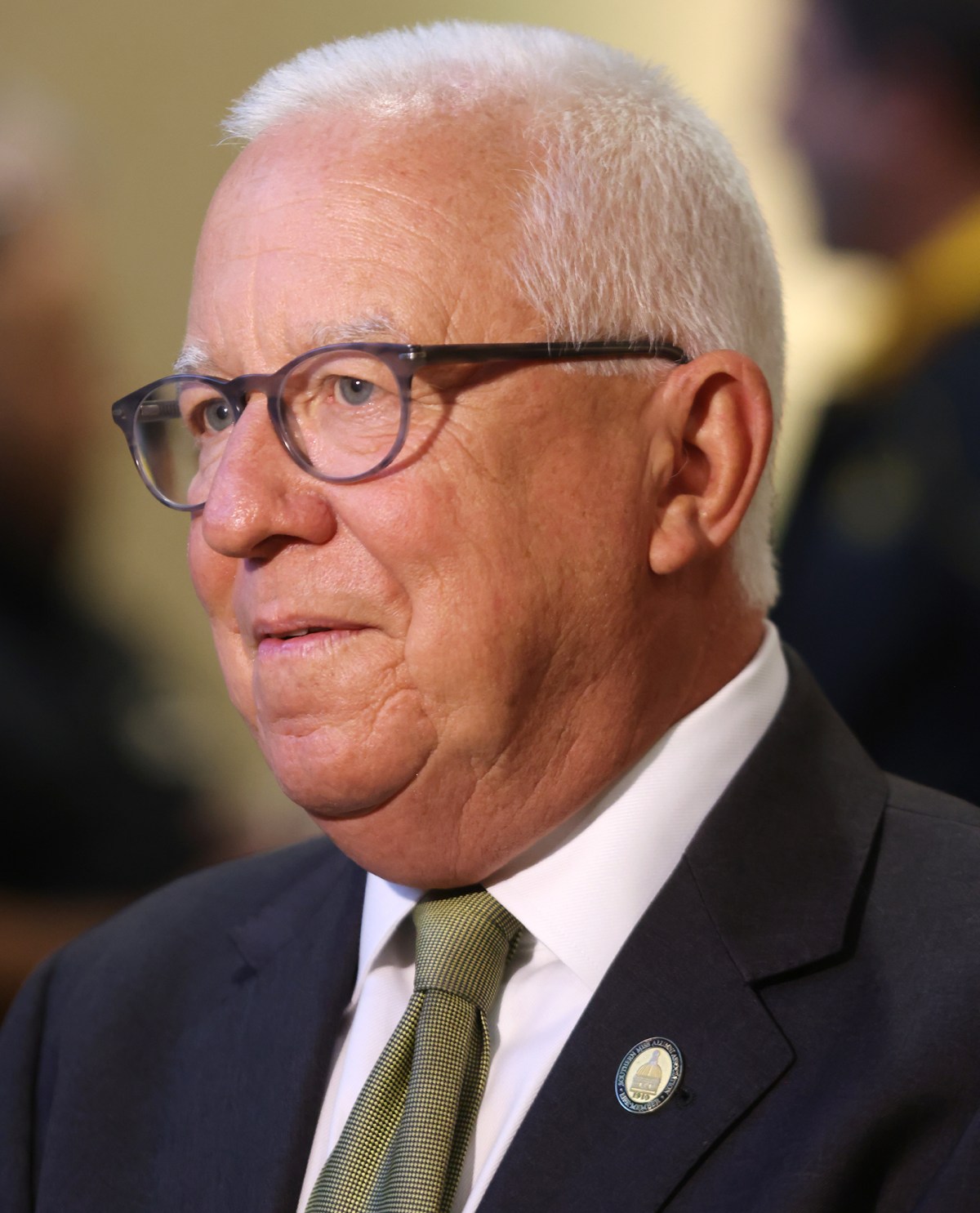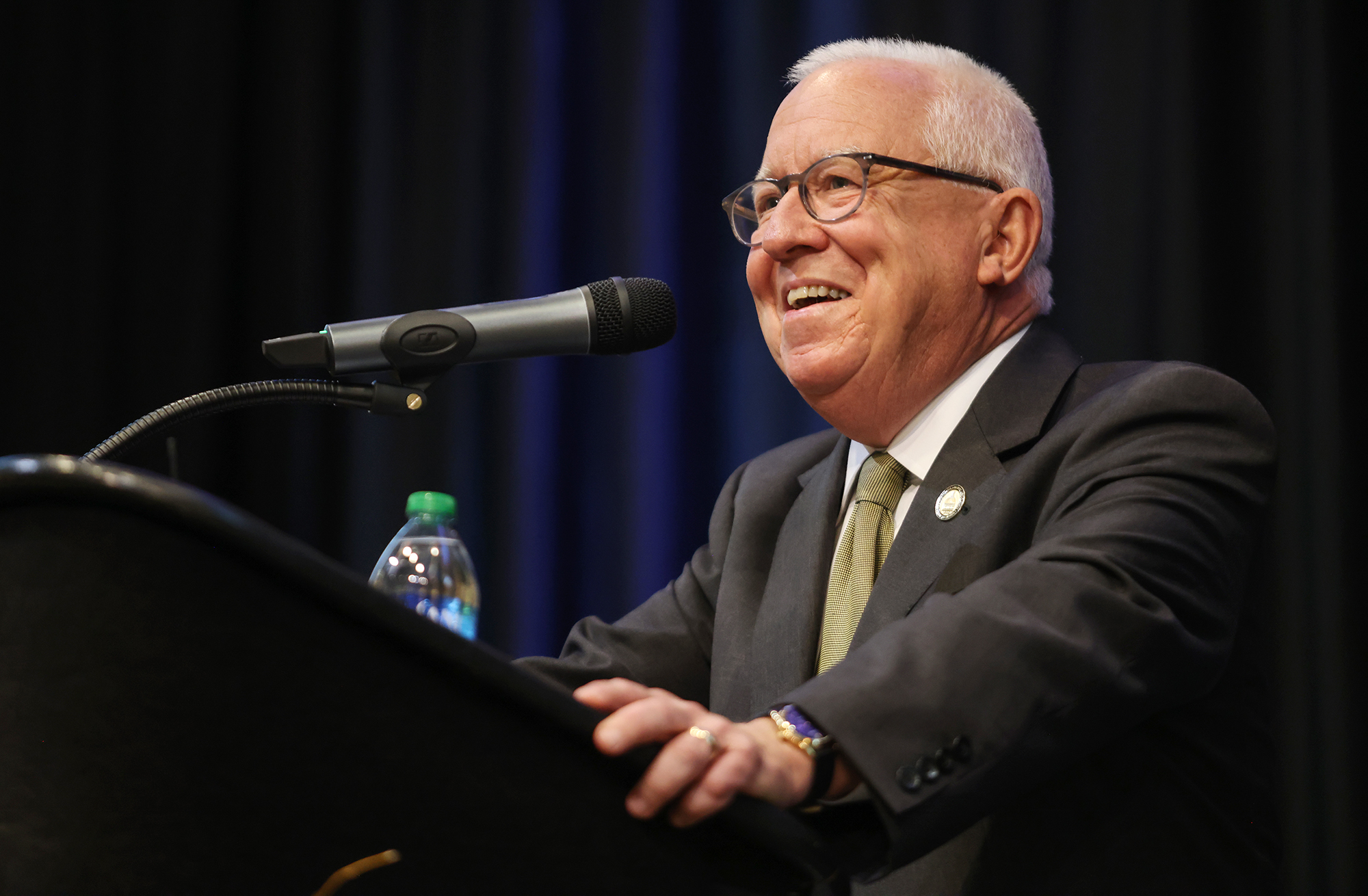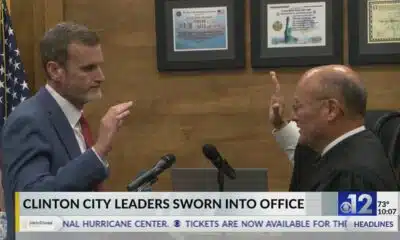Mississippi Today
New USM President Joe Paul discusses welfare scandal, diversifying students and faculty, and falling enrollment
New USM President Joe Paul discusses welfare scandal, diversifying students and faculty, and falling enrollment
New president of University of Southern Mississippi Joe Paul sat down for a 45-minute interview with Mississippi Today on Tuesday.
Paul, who is serving a four-year term with an annual salary of $650,000, discussed his priorities — including enrollment, especially at USM Gulf Park; maintaining the university’s top-tier research status; and fundraising, along with the need to increase the number of diverse students and faculty. He also read a prepared statement about the university’s role in the welfare scandal.
Paul was joined by Jim Coll, the university’s chief communications officer.
This interview has been edited for clarity and length.
Molly Minta: Can you talk about the university’s overall and current financial picture, particularly in the context of declining state appropriations in the last few decades?

Joe Paul: And more recently, a slight downturn in enrollment. The good news is that the University of Southern Mississippi is in excellent fiscal health. … We have about $150 million in unrestricted reserves. …If a disaster struck, and there were no external funding, we can operate for 155 days, which is well beyond the standard. (Editor’s note: IHL’s recommended minimum is 90 days cash on hand.)
The final thing deals with what we call our debt-ratio coverage. We’ve got about $13 million dollars in annual debt that comes with bonds for construction. Our coverage rate is just below 2.0 and that basically means we have twice as much as we need to assure that we can pay our debts.
Minta: You brought up the slight downturn in enrollment. (Editor’s note: Enrollment declined by 4.4% this fall to 13,526 students, according to IHL). How does that affect the overall financial picture?
Paul: I began in higher education over 40 years ago, and at that time, state appropriations probably covered 70-to-80% of the (budget). . Today that’s almost flipped, so enrollment becomes critical.
Minta: Does it seem like it’s possible to advocate (for) increased funding for higher education from the Legislature? Or is it just a picture of turning to other sources of funding?
Paul: Not to be ambiguous, but I think the answer is both. … We’ve got to continue to advocate for adequate funding to create top-level academic opportunities for Mississippi residents. At the same time, we’ve got to be really creative in terms of budget management. You cannot tuition your way out of a drop in state appropriations or a drop in enrollment. …The way I view student recruitment and enrollment growth is … it’s strategy, it’s processes … how customer friendly you can be is critical. … (It’s also) investment. What are you going to invest in marketing? What are you going to invest in scholarships? What are you going to invest in personnel to do recruitment? The final part is effort.
We were encouraged that in spite of the demographic shift toward fewer high school graduates — and more high school graduates going into vocational and technical programs, which is not a bad thing for the state of Mississippi — that we did have a slight uptick in freshmen this fall. I’m also encouraged — because we really focused on the community colleges this fall — that we’ve got 300 more new transfer students enrolled for spring semester. That’s a double-digit percentage bump for us.
Minta: What I would want to touch on a little more is if you could help people understand the drivers of the enrollment drop? … People seem to feel like there was an institutional failure that had contributed to the enrollment decline. (Is) there an element here where it’s unavoidable given the demographics that there’s going to be an enrollment drop?
Paul: … I don’t spend a lot of time in the rearview mirror in terms of what has happened — except as that might inform us going forward. Another core part of my leadership strategy is that I truly believe that two of the greatest wastes of human energy and leadership are blaming and justifying.
… For us, we’ve got to refocus on South Mississippi. … We’re located in the part of the state where there’s the most people and where there’s the most dynamic growth, right? … There’s no valid reason that students should drive through Hattiesburg to go to school anywhere else in Mississippi — that’s our mantra.
We’ve got to make sure that what we offer is distinctive from other options, whether they’re in state and certainly out of state. … If you want the bells and whistles (of a large university), in terms of the quality of the faculty, being able to engage in research as an undergraduate, state-of-the-art facilities, major college athletics, fraternities and sororities, you name it, and yet you want a bit more personal attention? Southern Miss is a great choice for you.
Minta: Tom Duff, the current IHL board president, (has) talked about what makes the satellite campus on the Gulf Coast, USM Gulf Park, really valuable. … Does increasing enrollment at Gulf Park factor into this overall strategy that you just laid out? What sort of conversations or plans have been started in terms of revitalizing that campus?
Paul: Molly, absolutely it does. It’s not only a mandate for me from the IHL board, but it is critical.
We’re the only dual-campus university in Mississippi, and (the) Mississippi Gulf Coast is a dynamic place. … When you talk about capacity and under-utilization (at Gulf Park), that is clearly a fact. … Let me be clear, my priorities are to grow enrollment overall, which means Hattiesburg, online and Gulf Park. … It’s not about that historical stuff about something we do at Gulf Park might hurt something in Hattiesburg. That is false logic. It’s not a part of what we’re about going forward.
So the overall strategy for growing Gulf Park comes down to this: Coastal academic programs for coastal people for coastal jobs. … What I want to do is focus programs on the Gulf Park campus that will lead to excellent job opportunities on the Mississippi Gulf Coast. … You’re going to have people — we already do in hydrographic science — that would come there from all over the world.
The other thing that we must do is we’ve got to forge a stronger partnership with Mississippi Gulf Coast Community College. That community college is a juggernaut. …. And also for Pearl River Community College. I envision a time soon when Mississippi Gulf Coast Community College faculty can teach classes on our campus and where we, as needed, can go to the Harrison County campus and teach Southern Miss courses. …
Minta: … What is the university’s commitment to keep or increase general education on the coast?
Paul: Because our Gulf Park campus is a non-residential campus, we’ve got to measure what we offer in terms of academic programming by the market demand.
I guess the best short answer is … we’ve got to be really careful to make sure that we’re doing things that are scalable and have a return on investment so that we can grow the campus. If we expended all of our resources on general education programs with very low enrollment, we would not have the resources to expand these programs that are more relevant to the Gulf Coast.
Minta: Last month, the state of Mississippi added USM’s volleyball stadium to its attempt to recoup the misspent welfare funds. Does USM plan to repay all of the improperly allocated welfare funds that have been questioned in the forensic audit? That would include not just the volleyball stadium but things like the $840,000 that was given to a ‘Student Development Program’ that was used to buy speciality performance drinks, popsockets and massages for student athletes?
Paul: Yeah. Molly, as you are well aware, from a legal standpoint it is an incredibly complex situation, right? And because the Southern Miss Athletic Foundation has now been named a party to the suit from DHS, I cannot comment because of pending litigation.
But I do want to say this: I’m deeply troubled by this. All of us are here. And anything that distracts us from our mission to serve the state of Mississippi concerns us gravely. And I’m committed to resolving this situation within legal limits as we move forward toward our goals and will remain relentless in our desire to reach an equitable resolution for all.
Minta: A lot of people were also unsatisfied with the statement on the welfare scandal. Many faculty and alumni … want the university to fully account for its role in the scandal; something like that would include a detailed timeline and who was involved. Is that something USM plans to do?
Paul: … We have complied with every request for information. All of that information is out there and accessible to our faculty and staff. And I understand and appreciate the point of view and have had a lot of conversations with faculty, collectively and individually, about it.
Minta: In terms of complying with every request for information, is that from the state of Mississippi, from reporters, from faculty?
Paul: Yes. (Editor’s note: USM officials have not responded to multiple questions from Mississippi Today about its November statement or the welfare funds it spent on perks for student athletes.)
Minta: Conservative lawmakers in Southern states are increasingly taking aim at tenure by linking the job protection to attacks against critical race theory. In Mississippi, past attempts in the Legislature to ban tenure have died in committee, but faculty want to know how you would respond to an effort from the state Legislature to ban tenure.
Paul: I believe absolutely that both academic freedom and the system of tenure are a cornerstone of what makes public higher education in the United States unique in all the world.
Our professors spend a great amount of their lives preparing themselves to become a PhD and a distinguished scholar and they have to have the unfettered ability to teach as they choose. And as president of Southern Miss, I will always defend that.
Minta: There has been a decline in the number of tenure-track faculty at USM from 2017 to 2021. There’s another view of attack on tenure as simply universities not filling those jobs or filling those jobs with adjunct professors. Faculty would like to know, would the university commit to increasing tenure-track positions?
Paul: I’m not privy to those numbers yet, Molly, and I don’t know if we have them–
Minta: They’re on IHL’s website.
Paul: This is a little bit speculative, because I wasn’t here, right, but it could be that a lot of that shift has to do with temporary budget constraints.
There are few things more important to this university than maintaining and enhancing our Carnegie (R1) designation. And, of course, our SACS accreditation. We cannot maintain and enhance that by creating a pattern of reducing tenure-track positions. … There is no movement afoot here to shift away from tenure-track and toward non-tenured instructors. This is a major research university, and we attract tenure-track professors who are great teachers and incredible scholars.
Can I talk more about the (R1 designation)? It’s prestigious. … But the prestige alone is not the value. … First, we’re a public university paid for by the taxpayers of Mississippi and (R1) designation allows us to create research, discovery, innovation that can lead to enhancing the quality of life and economic development in Mississippi. (R1) designation also allows us to recruit the best and brightest faculty from all over – not just the nation, but the world.
It’s critical that we maintain that (status) and that not only informs that question you had about tenure, but a lot of other questions you may have, such as compensation for graduate students. We’re in the first year of a three-year plan to enhance our graduate assistant stipends. (Editor’s note: The plan would increase stipends to $11,700 by fall 2024).
Minta: Another question about faculty that gets into a broader question about the university. Faculty are overwhelmingly white at USM.
Paul: Yes.
Minta: In 2021, there were just 52 Black faculty and 17 Hispanic faculty compared to 688 White faculty. Those are numbers from IHL.
Black students also make up 27% USM’s student body which is a higher percentage than its peer universities in Mississippi. It’s a higher rate among the predominantly white institutions in the state, but if you look at the overall demographics of … Mississippi, it’s still not equitable. Why aren’t Black students attending USM? Why aren’t Black faculty coming to teach at USM? What can the university better do to serve this community?
Paul: … I need to point out that in many ways, our student body is the most reflective in Mississippi, among research universities, of the population in our state, in terms of African American Mississippians, in terms of other kinds of areas … the ratio of in-state to out-of-state students would be another example.
That’s not to say that we’re good there, Molly, okay? Because my core belief is that as a state institution, we should reflect the population that we serve.
You sort of phrased the question like, what’s the problem? To me, it’s not, ‘what’s the problem?’ It’s, ‘what’s the opportunity?’ … I think the far more challenging, perplexing problem is how do we create a faculty that reflects the demographics of our current student body? That’s not a challenge unique to Southern Miss. … Currently, we are in a search for a new permanent provost and … the first conversation that I want to have with that person is around diversity, equity and inclusion. Specifically, how can we recruit and retain more non-white faculty members at Southern Miss? … We don’t have answers for you today.
… I think traditionally what we’ve done in faculty recruitment is wait till they’re out there and let them come to you. When it comes to diversifying the faculty, my idea would be, why don’t we start to build relationships with a diverse pool of students while they’re pursuing their doctoral degrees at outstanding institutions? Another side of the equation is, what are we doing for diverse faculty members when they get here? How are we making sure that they are welcome?
Minta: Have you looked more at (how to diversify) the student body or more at specific strategies or types of outreach the university should be doing?
Paul: We have an incredibly strong program currently in terms of student life around diversity, equity, and inclusion. … Though the number of high school graduates is (going to be) decreasing in Mississippi, the diversity of those graduates is increasing. They’re more non-white each year, so the opportunity is there. We’re going to be more diverse.
Minta: Is it a matter of making the campus more welcoming or providing more scholarships or financial aid for non-white or Black students specifically?
Pau: It’s all of that. It’s making sure that you’ve got a diverse staff and student life. … Growing the diversity of faculty is a key to it. And it’s making sure (there is) diversity in terms of recruitment staff. Molly, it has to be more than words, you know?
Minta: The average faculty salary at USM during the 2020-21 school year was little over $70,000 and that is significantly less than the SREB average. The average staff member makes a little more than $47,000. How do you plan to meaningfully increase faculty and staff pay, keeping in mind that the percentage-base pay increases that are granted by the Legislature don’t keep pace with inflation or the increase in the cost of health insurance?
Paul: I think we’re about 80% of the SREB average in Mississippi in general.
I am strongly committed to increasing pay for faculty and staff, from professional staff to those hard-working folks that keep this place going every day. I don’t disagree that largely what the Legislature has been able to do — I’m grateful for it and extremely hopeful again this year — is that as they appropriate for increases, at least in our short-run economy, that inflation is outpacing that.
… There is no magic-wand solution to that. One of the things that can enable us to do that is … to create revenue through the increasing number of students that we can then commit to moving faculty salaries toward the SREB average.
Minta: Is there anything I haven’t asked about that you’d like to talk about?
Jim Coll, addressing Paul: Priority-wise, we’ve talked about a couple things, but you haven’t talked about private fundraising.
Paul: Yeah, I mean, I don’t know who I’ve got out there. So, there are a couple things I want to tell you.
I think the role of the president as a leader in higher education is critical. … I want to establish … a sense of being present and accessible to our students, our faculty, our staff, alumni and other constituents. The other side of it is that I absolutely believe that … you’ve got to earn the trust of those that you’ve been given the responsibility to lead. Trust is not given … it has to be earned every day by the relationship between what you say and what you commit to and what you do.
The other (piece) of the main agenda from me … is private philanthropy. One of my goals is to push us well beyond the $150 million goal that we have in our Capital Campaign. We rest at about $132 million now. Since I’ve been here in July, we’ve raised about $8 million. I want to push it well beyond that.
Minta: There was another question I wanted to ask. Last year, the student newspaper ran an article on how international students would like more support, particularly when it comes to finding housing and securing internships and scholarships. Have you been doing anything to address these concerns and if so, what?
Paul: I’m aware of that. I’ve got a working to-do list but, Molly, I’ve not been able to corral the folks yet to have that conversation. I think it’s critically important.
The number of international students ebbs and flows and right now. … But every student that comes to Southern Miss deserves … the full Southern Miss experience, not to be marginalized. And that certainly includes our international students.
This article first appeared on Mississippi Today and is republished here under a Creative Commons license.
Did you miss our previous article…
https://www.biloxinewsevents.com/?p=203911
Mississippi Today
Trump nominates Baxter Kruger, Scott Leary for Mississippi U.S. attorney posts
President Donald Trump on Tuesday nominated Baxter Kruger to become Mississippi’s new U.S. attorney in the Southern District and Scott Leary to become U.S. attorney for the Northern District.
The two nominations will head to the U.S. Senate for consideration. If confirmed, the two will oversee federal criminal prosecutions and investigations in the state.
Kruger graduated from the Mississippi College School of Law in 2015 and was previously an assistant U.S. attorney for the Southern District. He is currently the director of the Mississippi Office of Homeland Security.
Sean Tindell, the Mississippi Department of Public Safety commissioner, oversees the state’s Homeland Security Office. He congratulated Kruger on social media and praised his leadership at the agency.
“Thank you for your outstanding leadership at the Mississippi Office of Homeland Security and for your dedicated service to our state,” Tindell wrote. “Your hard work and commitment have not gone unnoticed and this nomination is a testament to that!”
Leary graduated from the University of Mississippi School of Law, and he has been a federal prosecutor for most of his career.
He worked for the U.S. Attorney’s Office in the Western District of Tennessee in Memphis from 2002 to 2008. Afterward, he worked at the U.S. Attorney’s Office for the Northern District of Mississippi in Oxford, where he is currently employed.
Leary told Mississippi Today that he is honored to be nominated for the position, and he looks forward to the Senate confirmation process.
This article first appeared on Mississippi Today and is republished here under a Creative Commons Attribution-NoDerivatives 4.0 International License.
The post Trump nominates Baxter Kruger, Scott Leary for Mississippi U.S. attorney posts appeared first on mississippitoday.org
Note: The following A.I. based commentary is not part of the original article, reproduced above, but is offered in the hopes that it will promote greater media literacy and critical thinking, by making any potential bias more visible to the reader –Staff Editor.
Political Bias Rating: Centrist
This article presents a straightforward news report on President Donald Trump’s nominations of Baxter Kruger and Scott Leary for U.S. attorney positions in Mississippi. It focuses on factual details about their backgrounds, qualifications, and official responses without employing loaded language or framing that favors a particular ideological perspective. The tone is neutral, with quotes and descriptions that serve to inform rather than persuade. While it reports on a political appointment by a Republican president, the coverage remains balanced and refrains from editorializing, thus adhering to neutral, factual reporting.
Mississippi Today
Jackson’s performing arts venue Thalia Mara Hall is now open
After more than 10 months closed due to mold, asbestos and issues with the air conditioning system, Thalia Mara Hall has officially reopened.
Outgoing Mayor Chokwe A. Lumumba announced the reopening of Thalia Mara Hall during his final press conference held Monday on the arts venue’s steps.
“Today marks what we view as a full circle moment, rejoicing in the iconic space where community has come together for decades in the city of Jackson,” Lumumba said. “Thalia Mara has always been more than a venue. It has been a gathering place for people in the city of Jackson. From its first class ballet performances to gospel concerts, Thalia Mara Hall has been the backdrop for our city’s rich cultural history.”
Thalia Mara Hall closed last August after mold was found in parts of the building. The issues compounded from there, with malfunctioning HVAC systems and asbestos remediation. On June 6, the Mississippi State Fire Marshal’s Office announced that Thalia Mara Hall had finally passed inspection.
“We’re not only excited to have overcome many of the challenges that led to it being shuttered for a period of time,” Lumumba said. “We are hopeful for the future of this auditorium, that it may be able to provide a more up-to-date experience for residents, inviting shows that people are able to see across the world, bringing them here to Jackson. So this is an investment in the future.”
In total, Emad Al-Turk, a city contracted engineer and owner of Al-Turk Planning, estimates that $5 million in city and state funds went into bringing Thalia Mara Hall up to code.
The venue still has work to be completed, including reinstalling the fire curtain. The beam in which the fire curtain will be anchored has asbestos in it, so it will have to be remediated. In addition, a second air-conditioning chiller needs to be installed to properly cool the building. Until it’s installed, which could take months, Thalia Mara Hall will be operating at a lower seating capacity of about 800.
“Primarily because of the heat,” Al-Turk said. “The air conditioning would not be sufficient to actually accommodate the 2,000 people at full capacity, but starting in the fall, that should not be a problem.”
Al-Turk said the calendar is open for the city to begin booking events, though none have been scheduled for July.
“We’re very proud,” he said. “This took a little bit longer than what we anticipated, but we had probably seven or eight different contractors we had to coordinate with and all of them did a superb job to get us where we are today.”
This article first appeared on Mississippi Today and is republished here under a Creative Commons Attribution-NoDerivatives 4.0 International License.
The post Jackson’s performing arts venue Thalia Mara Hall is now open appeared first on mississippitoday.org
Note: The following A.I. based commentary is not part of the original article, reproduced above, but is offered in the hopes that it will promote greater media literacy and critical thinking, by making any potential bias more visible to the reader –Staff Editor.
Political Bias Rating: Centrist
The article presents a straightforward report on the reopening of Thalia Mara Hall in Jackson, focusing on facts and statements from city officials without promoting any ideological viewpoint. The tone is neutral and positive, emphasizing the community and cultural significance of the venue while detailing the challenges overcome during renovations. The coverage centers on public investment and future prospects, without partisan framing or editorializing. While quotes from Mayor Lumumba and a city engineer highlight optimism and civic pride, the article maintains balanced, factual reporting rather than advancing a political agenda.
Mississippi Today
‘Hurdles waiting in the shadows’: Lumumba reflects on challenges and triumphs on final day as Jackson mayor
On his last day as mayor of Jackson, Chokwe Antar Lumumba recounted accomplishments, praised his executive team and said he has no plans to seek office again.
He spoke during a press conference outside of the city’s Thalia Mara Hall, which was recently cleared for reopening after nearly a year of remediation. The briefing, meant to give media members a peek inside the downtown theater, marked one of Lumumba’s final forays as mayor.
Longtime state Sen. John Horhn — who defeated Lumumba in the Democratic primary runoff — will be inaugurated as mayor Tuesday, but Lumumba won’t be present. Not for any contentious reason, the 42-year-old mayor noted, but because he returns to his private law practice Tuesday.
“I’ve got to work now, y’all,” Lumumba said. “I’ve got a job.”
Thalia Mara Hall’s presumptive comeback was a fitting end for Lumumba, who pledged to make Jackson the most radical city in America but instead spent much of his eight years in office parrying one emergency after another. The auditorium was built in 1968 and closed nearly 11 months ago after workers found mold caused by a faulty HVAC system – on top of broken elevators, fire safety concerns and vandalism.
“This job is a fast-pitched sport,” Lumumba said. “There’s an abundance of challenges that have to be addressed, and it seems like the moment that you’ve gotten over one hurdle, there’s another one that is waiting in the shadows.”
Outside the theater Monday, Lumumba reflected on the high points of his leadership instead of the many crises — some seemingly self-inflicted — he faced as mayor.
He presided over the city during the coronavirus pandemic and the rise in crime it brought, but also the one-two punch of the 2021 and 2022 water crises, exacerbated by the city’s mismanagement of its water plants, and the 18-day pause in trash pickup spurred by Lumumba’s contentious negotiations with the city council in 2023.
Then in 2024, Lumumba was indicted alongside other city and county officials in a sweeping federal corruption probe targeting the proposed development of a hotel across from the city’s convention center, a project that has remained stalled in a 20-year saga of failed bids and political consternation.
Slated for trial next year, Lumumba has repeatedly maintained his innocence.
The city’s youngest mayor also brought some victories to Jackson, particularly in his first year in office. In 2017, he ended a furlough of city employees and worked with then-Gov. Phil Bryant to avoid a state takeover of Jackson Public Schools. In 2019, the city successfully sued German engineering firm Siemens and its local contractors for $89 million over botched work installing the city’s water-sewer billing infrastructure.
“I think that that was a pivotal moment to say that this city is going to hold people responsible for the work that they do,” Lumumba said.
Lumumba had more time than any other mayor to usher in the 1% sales tax, which residents approved in 2014 to fund infrastructure improvements.
“We paved 144 streets,” he said. “There are residents that still are waiting on their roads to be repaved. And you don’t really feel it until it’s your street that gets repaved, but that is a significant undertaking.”
And under his administration, crime has fallen dramatically recently, with homicides cut by a third and shootings cut in half in the last year.
Lumumba was first elected in 2017 after defeating Tony Yarber, a business-friendly mayor who faced his own scandals as mayor. A criminal justice attorney, Lumumba said he never planned to seek office until the stunning death of his father, Chokwe Lumumba Sr., eight months into his first term as mayor in 2014.
“I can say without reservation, and unequivocally, we remember where we started. We are in a much better position than we started,” Lumumba said.
Lumumba said he has sat down with Horhn in recent months, answered questions “as extensively as I could,” and promised to remain reachable to the new mayor.
This article first appeared on Mississippi Today and is republished here under a Creative Commons Attribution-NoDerivatives 4.0 International License.
The post 'Hurdles waiting in the shadows': Lumumba reflects on challenges and triumphs on final day as Jackson mayor appeared first on mississippitoday.org
Note: The following A.I. based commentary is not part of the original article, reproduced above, but is offered in the hopes that it will promote greater media literacy and critical thinking, by making any potential bias more visible to the reader –Staff Editor.
Political Bias Rating: Center-Left
The article reports on outgoing Jackson Mayor Chokwe Antar Lumumba’s reflections without overt editorializing but subtly frames his tenure within progressive contexts, emphasizing his self-described goal to make Jackson “the most radical city in America.” The piece highlights his accomplishments alongside challenges, including public crises and a federal indictment, maintaining a factual tone yet noting contentious moments like labor disputes and governance issues. While it avoids partisan rhetoric, the focus on social justice efforts, infrastructure investment, and crime reduction, as well as positive framing of Lumumba’s achievements, aligns with a center-left perspective that values progressive governance and accountability.
-
Mississippi Today6 days ago
Defendant in auditor’s ‘second largest’ embezzlement case in history goes free
-
News from the South - Georgia News Feed5 days ago
Are you addicted to ‘fridge cigarettes’? Here’s what the Gen Z term means
-
The Conversation6 days ago
Toxic algae blooms are lasting longer than before in Lake Erie − why that’s a worry for people and pets
-
News from the South - Tennessee News Feed6 days ago
5 teen boys caught on video using two stolen cars during crash-and-grab at Memphis gas station
-
News from the South - South Carolina News Feed5 days ago
Federal investigation launched into Minnesota after transgender athlete leads team to championship
-
Local News6 days ago
St. Martin trio becomes the first females in Mississippi to sign Flag Football Scholarships
-
Local News6 days ago
Mississippi Power shares resources and tips for lowering energy bill in the summer
-
News from the South - Kentucky News Feed7 days ago
Error that caused Medicaid denials has been corrected, says cabinet in response to auditor letter




















































